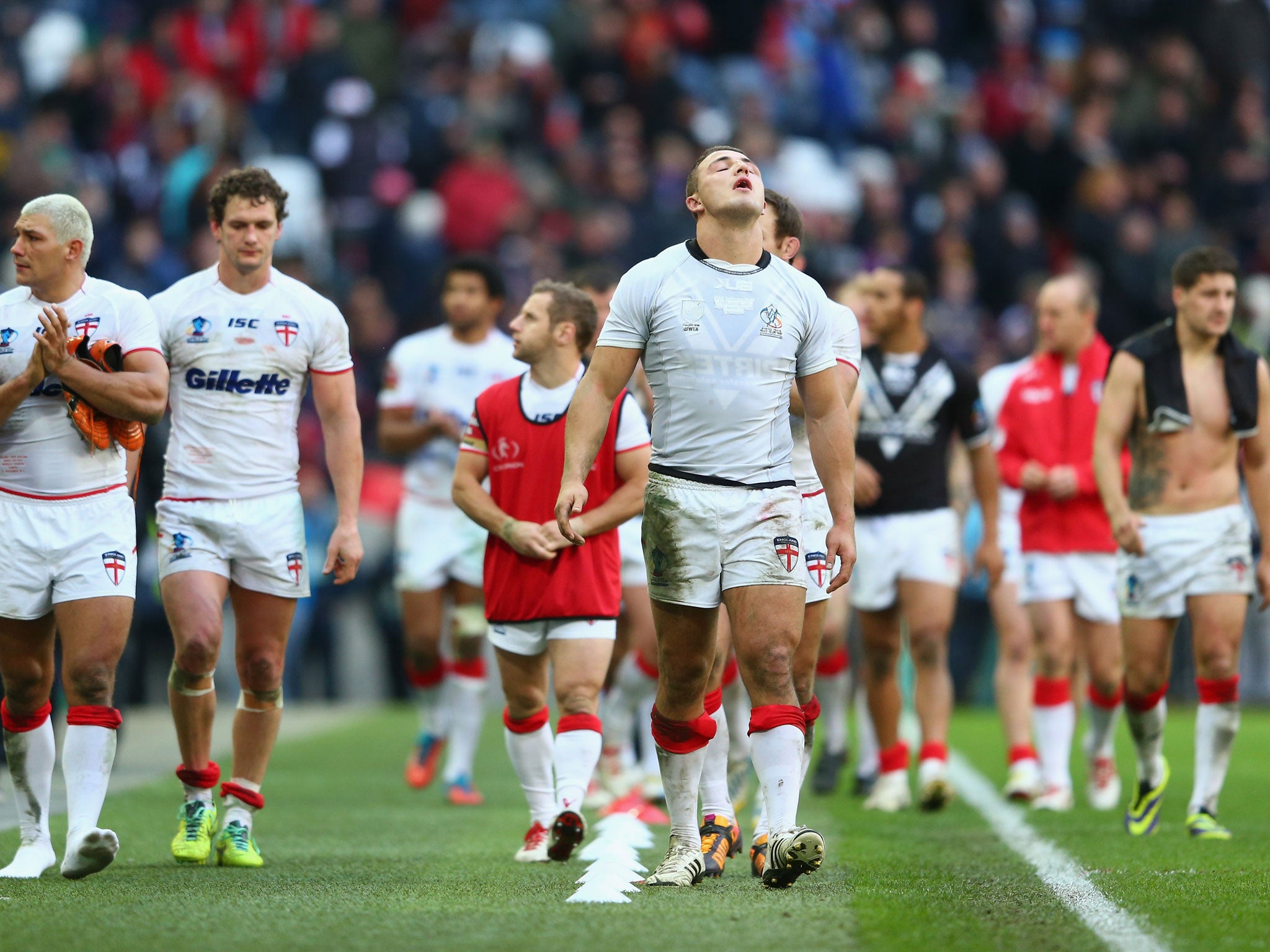England 18 New Zealand 20: Steve McNamara proud after one of the sport's great games
England’s World Cup semi-final defeat to New Zealand will live long in the memory

It will be the old firm of Australia and New Zealand in the Rugby League World Cup final at Old Trafford on Saturday, but it will be a lot longer than that before England stop thinking, “It should have been us.”
Should have – and would have, if not for a couple of random incidents which punctuated what was, without exaggeration, one of the best matches of all time.
The scoreboard showed that the Kiwis won 20-18 in front of a crowd of 67,545 at Wembley, but these are merely the bare bones of an extraordinary afternoon.
They would no longer have a chance to defend their World Cup had it not been for the way Dean Whare dragged back a ball that was going out of play by yards to set up their first try.
Their winner only happened because Frank-Paul Nu’uausala’s pass from dummy-half in the final minute was so long and loose and looping that it tempted Kevin Sinfield out of the defensive line, where Shaun Johnson skipped round him. Wembley’s seats will need a refurb; those fortunate to be present were on the edge of them from first to last.
The best game rugby league, in its modern form, has produced? That, as those aggravating Antipodeans would say, is a big call, but how about these more modest claims?
The most heart-breaking finale since Ricky Stuart and Mal Meninga got Australia out of jail at Old Trafford in 1990. The best match at Wembley since the epic Challenge Cup final of 1985. The best England have played since winning in Sydney in 2006. Saturday’s fare deserves all those accolades and more. It was a wonderful advertisement for how good the game can be, even in difficult times.
Even the England coach, Steve McNamara, who could have been forgiven for publicly slitting his wrists, made a brave attempt to celebrate the bigger picture.
“A lot of worse things happen in life,” he said. “We’re proud of such a brilliant game of rugby league. We’ve made huge progress.”
It is that progress that convinces him that he wants to carry on in his role, even though his contract is now up. He behaved with considerable dignity in his bitter disappointment, knowing that his players had done him proud in defeat.
There were certainly some titanic individual performances at Wembley; from man- of-the-match Sam Burgess, from James Graham, from Sean O’Loughlin and, despite his late rush of blood, from Sinfield.
McNamara can also claim to have got his big selection decision right. After looking understandably rusty at the start, Gareth Widdop had a strong, structured game in place of the enigmatic, erratic Rangi Chase, but then so did so many others.
Collectively, they were undeniably the better team, but New Zealand had players who did not deserve to be on the losing side either. Roger Tuivasa-Sheck is a freakishly gifted young winger, who they will hope will be fit for the final. Whare confirmed his standing as the best centre in the tournament and there was always Sonny Bill Williams, who grew in influence as the game went on, but still has, you suspect, another gear he is reserving for Australia in the already sold-out final.
The semi-final that put the Kangaroos there could not have been a bigger contrast with the glories of the first match, because Australia simply stomped on Fiji, to the tune of 64-0 – worse than the 52-0 outcome when they met in the semis five years ago and much worse than the 34-2 in the group match between the two sides.
It was continuing – and disappointing – evidence that the gap between the Big Three and the rest remains wide, despite heroics from Scotland, the United States and Italy in the group games.
The difference between this time and the previous two meetings with the Bati was that the men in green and gold were utterly ruthless. Of their 11 tries, three came from Jarryd Hayne, who played for Fiji in the last World Cup.
A more startling statistic is that it is now 324 minutes since Australia conceded a try – to England’s Josh Charnley in the opening game of the tournament. There’s another superlative for this World Cup; there has never been a more parsimonious team.
Such was their dominance that when Fiji formed their customary prayer circle after the match – a ritual in which their opponents joined – they could well have been giving thanks that it was all over.
Most of the England fans who have bought tickets for the Old Trafford final will still go along to witness the southern hemisphere’s private power struggle, but it will be with an empty feeling in the pits of their stomachs.
It will take another sensational game to silence the nagging voices and their reminder that it should have been England walking out at the Theatre of Dreams.
Subscribe to Independent Premium to bookmark this article
Want to bookmark your favourite articles and stories to read or reference later? Start your Independent Premium subscription today.

Join our commenting forum
Join thought-provoking conversations, follow other Independent readers and see their replies